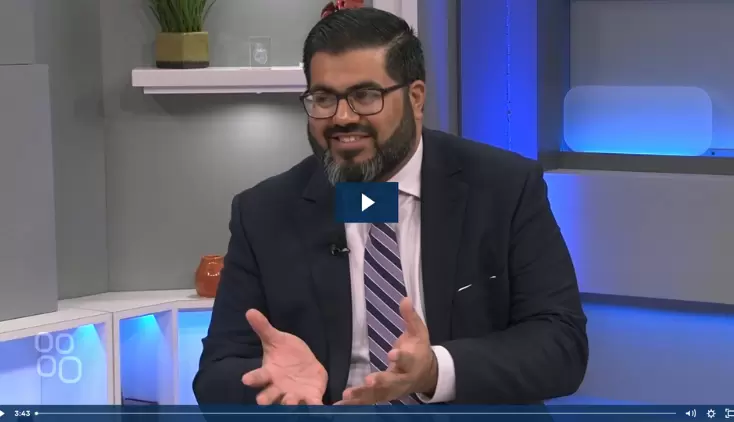Access & Closure, Anticoagulation, Patient Management, AMI Cardiogenic Shock
Amir Kaki: Minimizing Bleeding and Vascular Complications Seen in DanGer Shock and Optimizing Outcomes
Amir Kaki, M.D., FACC, FSCAI, discusses the adverse events reported in the DanGer Shock randomized controlled trial (RCT) and best practices for optimizing outcomes in patients with acute myocardial infarction cardiogenic shock (AMICS). Dr. Kaki is director of mechanical circulatory support at Ascension in Detroit, Michigan.
“The number needed to treat, I think is really important,” Dr. Kaki emphasizes, highlighting the very low NNT of 8 from DanGer Shock. “So keep that in mind as we talk about the complications.” He presents the graph of adverse events from the trial showing that compared to the the control group there was more stroke, more moderate/severe bleeding, more limb ischemia, more temporary renal replacement therapy (CRT), and more sepsis in the Impella arm of the trial. However, he emphasizes that use of best practices, including vascular and anticoagulation management, could further optimize outcomes.
Dr. Kaki examines patient-related factors, device-related factors, and anticoagulation management to help increase understanding of why complications occur. He explains that knowledge gaps can contribute to complications, such as not using a combination of ultrasound and fluoroscopy to guide femoral access, not ensuring antegrade perfusion before leaving the cath lab, not replacing heparin with bicarbonate in the purge solution, and not returning to the cath lab for device removal. “I think if we do some of these best practices, we could decrease the numbers that you saw there.”
He reviews pre-implantation best practices (comprehensive patient evaluation, vascular mapping, and multidisciplinary team approach) and reviews anatomical considerations before inserting Impella (eg, calcification, vessel size, plaque, and tortuosity). He also highlights the importance of having an Impella ICU management protocol, pointing to the multidisciplinary shock team algorithm implemented by one of his colleagues that reduced vascular complications post Impella from 25% to 3.9% in just a few years.
Dr. Kaki then walks through the key adverse events from DanGer Shock, highlighting best practices for optimizing outcomes for each of them. He also presents nuances he’s observed between European and US AMICS experience with Impella, including shorter duration of Impella support (average 48 hours in the National Cardiogenic Shock Initiative and average 60 hours in DanGer Shock RCT). “These are things that I think that we do differently, if you’re wondering why the complication rates that we saw in DanGer are a little bit different than what you’re used to if you’re at a high-volume institution.”
Dr. Kaki shares his personal reflections following the publication of the DanGer Shock RCT results: the 3Vs of validation, vindication, and victory (incomplete). “The event rates that we saw [in Danger Shock] were not what we’d ideally like to see,” Dr. Kaki concludes, but he is certain that implementation of best practices can bring complication rates down and potentially further improve survival rates.
Dr. Kaki compensated by and presenting on behalf of Abiomed and must present information in accordance with applicable regulatory requirements. This presentation includes Dr. Kaki's opinions and findings based on their own knowledge and experience.
NPS-5079


